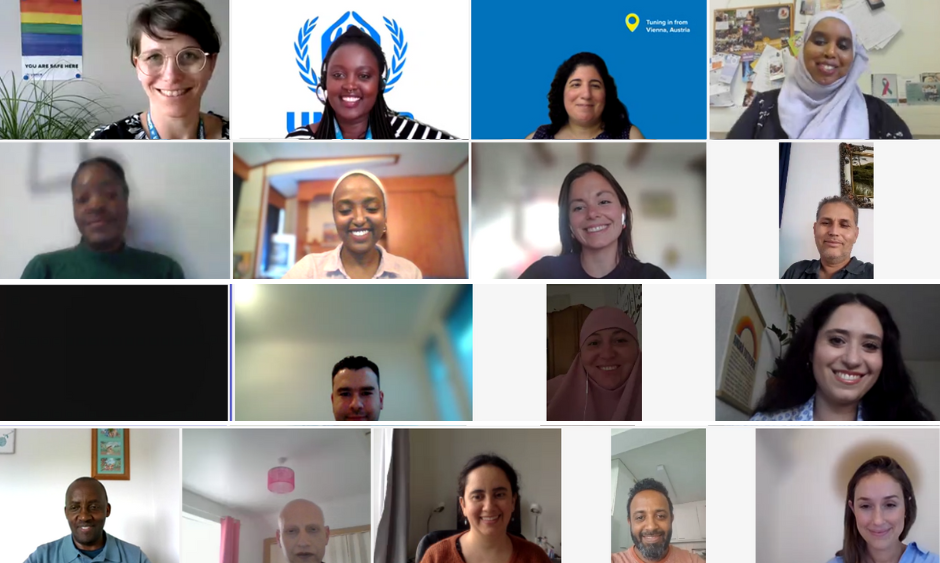Dublin conference hears calls for more safe and legal routes for refugees
Dublin conference hears calls for more safe and legal routes for refugees

Last Friday (9 September), UNHCR Ireland hosted a National Conference on Refugee Sponsorship Programmes and Student Scholarship schemes in Dublin City Council Offices in Wood Quay. Speakers from a number of countries and various backgrounds attended the conference, to describe and share examples of best practice in the field of safe and legal pathways for refugees.
The conference was opened by the Minister of State for Justice with special responsibility for Equality, Immigration and Integration David Stanton. After stressing the need for all countries to redouble their efforts to address the situations causing such large levels of forced migration, the Minister detailed some of Ireland’s current efforts: “The Government’s Irish Refugee Protection Programme is responding to the ongoing Syrian Crisis by offering some 4,000 places to those in need of international protection” said the Minister, who also added that “we expect to have admitted the majority of refugees of our resettlement quota of 520 by the end of September and to have reached that full quota by mid October.”
In relation to the relocation scheme he said, “Following meetings with Greek authorities … an accelerated pledge process has been agreed which will now allow Ireland to meet its relocation obligations to Greece in full, within the timeline of the relocation programme…. The programme ends in September 2017.”
On the question of student scholarships he also committed to support any new initiatives to grant access to third-level education, “If Irish third level institutions were to offer places to displaced students from conflict areas, with the necessary educational standards to cope with English language tuition, then they are entitled to apply for student visas. I expect that any such applications will be successful. This is current practice and student visas also include certain rights to access the labour market. Such initiatives from third level institutions would be of great benefit to displaced students and I assure you we already have measures in place to process any applications that would arise.”
UNHCR’s Head of Office Enda O’Neill then welcomed the attendants to the conference and gave the floor to the first panel of speakers.
Peter O’Sullivan, Resettlement Officer to UNHCR’s Bureau for Europe, talked about the danger of widespread racism and xenophobia and of the role of integration and resettlement as top issues for the European Union Institutions. While Resettlement represents the ‘tried and trusted’ avenue to provide durable solutions for refugees in third countries, he warned that resettlement alone cannot address all of the international protection needs.
“Although it has its roots in the response to the Syrian refugee situation, the call from UNHCR and its partners for States to consider the development of other pathways of admission is now firmly tied to a broader appeal for flexibility, innovation and solidarity with both those in need of protection and those non-industrialised States who are hosting the over-whelming majority of refugees worldwide.”
The second speaker on the panel was Louisa Taylor, director of Refugee 613, a project that provides information and opportunities for volunteering and private sponsorship in the Canadian city of Ottawa. In explaining the operation of Canadian private sponsorship schemes, Taylor highlighted how the death of Aylan Kurdi generated a strong wish to help among Canadian civil society, and how important political support for such schemes is. “The key to a strong community is that everybody feels at home”, said Taylor, “this can be achieved through private sponsorships”.
The final speaker on the panel was Commander Patrick Burke, who gave an overview of the work of the Irish Navy in search and rescue operations carried out in the Mediterranean. He gave an insight into the precarious and unsafe journeys undertaken by desperate refugees and migrants, and the challenging conditions in which the Navy conducts its activities. He also praised government for their leadership on this issue and their quick action to establish the agreement with the Italian authorities under which they operate.
The second part of the conference saw three other speakers describing their experiences in the field of refugee student scholarships. Michelle Manks, manager of the Canadian based WUSC student refugee program, explained how this scheme combines resettlement with opportunities for higher education. In stressing the need for durable solutions, she added that their aim is “to double the number of sponsorships and share best practice”. Last year, WUSC helped 160 refugee students travel to Canada to pursue third level education.
Portuguese lawyer Gonçalo Carrilho spoke about the Global Platform for Syrian Students, launched by the former Portuguese President Jorge Sampaio to provide emergency assistance for Syrian students in selected host countries as well as overseas. One of them, the Syrian architecture student Alaa’ Al Hariri, closed the panel with a powerful speech on refugees. “Syrians are just normal people,” she said, “we are more similar than we are different”.
The conference also saw the participation of the screen and stage actor Liam Cunningham, who gave an account of his recent trip to Jordanian refugee camps. "The desire for education is there as much as for food and water" he said.
You can read the full agenda for the conference here:
http://www.unhcr.ie/news/irish-story/national-conference-on-refugee-spo…





